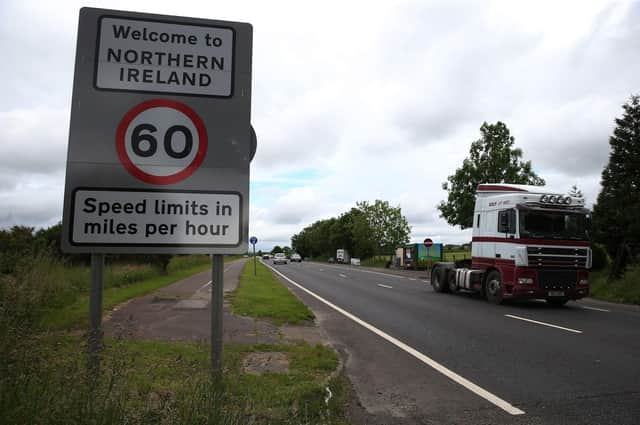Lord Lilley: Northern Ireland Protocol should be replaced by mutual enforcement


Critics assume that there is no alternative to the protocol which would avoid hard borders between Northern Ireland and both the Republic and Great Britain while protecting the integrity of the EU market.
But there is an alternative.
Insofar as the protocol is intended to protect the EU internal market from non-compliant goods, it is a hammer to crack a nut.


Advertisement
Hide AdAdvertisement
Hide AdIt subjects all goods circulating in Northern Ireland and entering NI from GB to the entire panoply of single market laws, regulations and validations. The protocol has 73 pages just the titles of EU laws which it wants to apply in Northern Ireland or on goods entering from GB.
Yet the EU’s only legitimate concern is with that tiny fraction of goods which are first, actually exported from NI to the Republic (these constitute just 0.2% cent of EU trade) and second – within that tiny amount – only that tiny fraction of goods for which UK standards in future diverge from those of the EU or fall foul of EU rules of origin.
Currently — when many EU rules have not yet been applied — the EU has not reported a single instance of goods crossing the border which have been a threat to their consumers or producers.
The obvious solution is to make it an offence in UK law to export goods from Northern Ireland to the Republic which do not conform to EU rules, regulations and standards.
Advertisement
Hide AdAdvertisement
Hide AdThis would not require checks at the border any more than border checks have ever been required to police the 20% difference in VAT rates between zero-rated goods exported to the Republic and those sold within NI. Companies were required, even when we were still in the EU, to record all exports to the EU on the ‘Europe List’ in their VAT returns.
Those lists would themselves provide evidence of what goods are being exported. In the event of suspicions about their compliance with EU standards the goods could be checked. But such checks would be made at the company’s premises, not at the border.
The EU would not depend solely on the UK authorities enforcing the requirement that goods exported from the UK comply with EU regulations. The EU would itself be able to prosecute in the UK courts any suppliers whose goods had been identified as non-compliant by its trading standards officers, customers or competitors (who have a strong interest in reporting non-compliance).
This approach is commonly called ‘mutual enforcement’, since it is usually assumed that it would require reciprocity. In principle, reciprocity would be desirable. That is, the EU/Republic of Ireland should likewise make it an offense to export goods into Northern Ireland which do not comply with UK regulations and standards. But reciprocity is not essential.
Advertisement
Hide AdAdvertisement
Hide AdIn the event of the UK taking action under Article 16 or resiling from the protocol, it would be sensible, and show good will, unilaterally to make it an offence to export non-compliant goods to the Republic/EU even if the EU chose not to reciprocate. That would reduce any excuse for ‘rebalancing measures’.
If the EU declined to reciprocate, the UK could still protect its own market — without border controls — from any EU goods that did not meet our standards (of which there will be very few). After all, Her Majesty’s Revenue and Customs (HMRC) was confident that they did not need border controls “under any circumstances” — including had there been no free trade agreement, in which case differential tariffs would have applied to many products.
Given the Trade and Cooperation Agreement eliminates all tariffs on goods from the EU, HMRC’s task would be far easier.
• Lord Lilley is a former Secretary of State for Trade & Industry and for Social Security. This article was first written for the website conservativehome
——— ———
A message from the Editor:
Advertisement
Hide AdAdvertisement
Hide AdThank you for reading this story on our website. While I have your attention, I also have an important request to make of you.
With the coronavirus lockdowns having had a major impact on many of our advertisers — and consequently the revenue we receive — we are more reliant than ever on you taking out a digital subscription.
Subscribe to newsletter.co.uk and enjoy unlimited access to the best Northern Ireland and UK news and information online and on our app. With a digital subscription, you can read more than 5 articles, see fewer ads, enjoy faster load times, and get access to exclusive newsletters and content.
Visit
now to sign up.
Our journalism costs money and we rely on advertising, print and digital revenues to help to support them. By supporting us, we are able to support you in providing trusted, fact-checked content for this website.
Ben Lowry, Editor